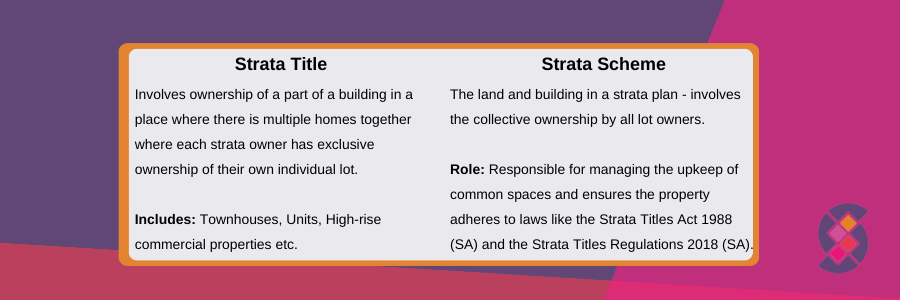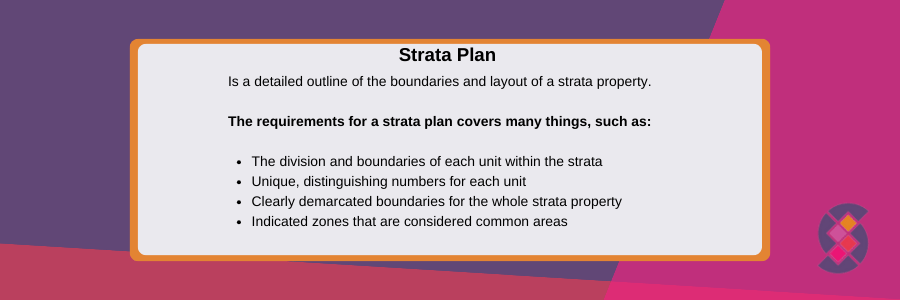Strata Titles, Strata Scheme, Strata Plan – What’s the Difference?
Strata titles, strata scheme, and strata plans are frequently used terminology in the strata and body corporate space, but what exactly do they mean, and how do they relate to one another?
Understanding the difference between these terms can help you to navigate the complicated and technical parts of strata management and ownership.
In this article, we’ll help to simplify what they mean, the role they play in strata, and how they relate to you, whether you’re a strata owner or tenant.
Table of Contents
- What is a Strata Title?
- What is a Strata Scheme?
- What is a Strata Plan?

What is a Strata Title?
A strata title refers to the system of ownership for a single property that has been subdivided into multiple units. These types of properties are known as strata.
Examples of strata title include townhouses, multi-level apartment buildings, high-rise commercial properties, retirement villages, and even holiday villas. Each of these properties have multiple ‘lots’ that are owned by different individuals and common areas that are shared between all lot owners. Strata owners have exclusive ownership of their lot or unit but collectively share common spaces such as hallways, swimming pools, parking areas and gardens.
What is a Strata Scheme?
Technically, the term Strata Scheme refers to the physical land and buildings that make up the Strata Plan,
However, in everyday usage, a strata scheme simply refers to the collective ownership of a strata property — made up of all the lot owners within it, without exception. Also known as a strata corporation, they are responsible for managing the upkeep of the strata’s common spaces for the benefit of all owners. One thing to note is that while lot owners are automatically part of the strata scheme, tenants who live in the units leased out by an owner are not considered as part of the strata scheme.
To help with decision making, a management committee is usually formed from the collective of owners via vote. This management committee exists to act on behalf of all the owners within the strata scheme to fulfil the responsibilities of maintaining common spaces, collecting levies from owners to fund the cost of maintenance, and enforcing by-laws.
The role of strata schemes extends to being responsible for the legal compliance of the strata property, ensuring that it continues to stay in line with the laws that govern strata ownership. In South Australia, the laws concerning strata compliance are contained in the Strata Titles Act 1988 (SA) and the Strata Titles Regulations 2018 (SA).
Some common laws include:
- not keeping pets or animals at the property without consent
- maintaining your unit in good condition
- not obstructing the common areas
- not using the unit for illegal purposes
In strata schemes of 4 or more owners, this responsibility can become rather taxing and complex. To take the load off the owners, a body corporate or strata management corporation is usually brought on to manage the property on behalf of all owners, and to assist in any decision making for the use of common areas and property rules.

What is a Strata Plan?
Since a strata property consists of multiple lots and common area, it must be represented by a detailed outline of the boundaries and layout of the entire strata. This outline is known as the strata plan, which must be registered with the South Australian Government’s Land Titles Office (now known as Land Services SA). As of 2009, new strata plans are not allowed to be submitted under the Strata Titles Act, and must be created under the Community Titles Act.
The requirements for a strata plan covers many things, such as:
- The division and boundaries of each unit within the strata
- Unique, distinguishing numbers for each unit
- Clearly demarcated boundaries for the whole strata property
- Indicated zones that are considered common areas
Most importantly for owners, strata plans will also include a schedule of unit entitlements. The schedule of unit entitlements basically shows the value of each unit or lot in the strata and is the determining factor of apportioning strata levies that owners will need to pay. A common misunderstanding is that unit entitlement is calculated based on the amount of floor space of the lot; it’s instead based on the perceived capital value of the lot. The higher the unit entitlement, the more strata levies will need to be paid.
Another important document lodged with the strata plan is the articles or by-laws. These apply to all residents and tenants of the strata, governing what is permitted and what is restricted. These regulations can range from the use of common property to the ability of tenants to carry out renovations in units. Think of it as a set of rules that help to keep the peace and enforce fairness in a shared environment where many people live and work.
Managing Your Strata Scheme
If you are part of a strata scheme, you’ll no doubt have experienced first-hand the complexities of strata management and legal compliance. Despite clearly set out articles or by-laws, there can sometimes be disagreements or grey-area situations that arise as a result of owners or tenants rubbing against one another in the property. At times like these, it will be up to the strata corporation or management committee to settle the matter through discussions, and the solutions are not always clear-cut. To add to this, strata compliance can also be confusing for those that are not as familiar with legal terms, which can potentially result in costly and disruptive consequences for your strata scheme.
This is why many strata schemes opt for a strata management company to help guide and assist the corporation and management committee in fulfilling the many responsibilities that are involved with strata ownership. Strata Data has over 40 years of experience in offering professional body corporate services for strata schemes right here in Adelaide and all across South Australia. If you are a strata developer, our services also extend to assisting you on your next community strata property development, from ensuring smooth registrations to checking off legal compliances.



